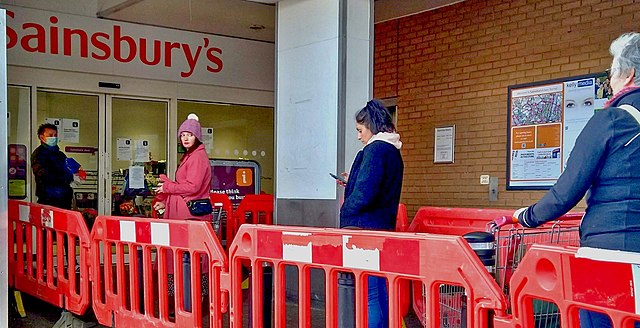Baklava, frites, wine, cannabis, guns. The pandemic classified them as essentials but they’re indulgences

Social distancing in a London supermarket queue. Photo: Philafrenzy, Creative Commons Attribution-Share Alike 4.0 International license.
In Turkey, baklava-makers were deemed essential workers during the coronavirus lockdown because Turks like to eat the layered, flaky pastry, moistened with syrup and sprinkled with nuts at all times.
Belgium allowed its friteries to stay open even as it closed down other commercial activities because it deemed the sidewalk stands that serve up French fries essential to people’s sense of wellbeing.
Wine shops (and small bakeries and butchers) were the exception to France’s shutdown order and marijuana-to-go Netherlands allowed takeaway sales of marijuana from cannabis coffeeshops.
Bikes were the exception to the lockdown rule in Germany and newsstands selling print newspapers in Italy. Different US states picked out different essentials for the lockdown: Connecticut and Texas had gun shops; New Hampshire had flower shops.
We didn’t need a pandemic to know that disparate parts of the world have different ideas of what’s essential to human happiness. But it does help reinforce the glorious diversity, even as we see the common thread.
Across the planet, healthcare workers, law enforcement, the utilities, food production and communications were deemed essential. They are the basics; the real essentials.
Baklava, frites, wine and everything else are indulgences.

